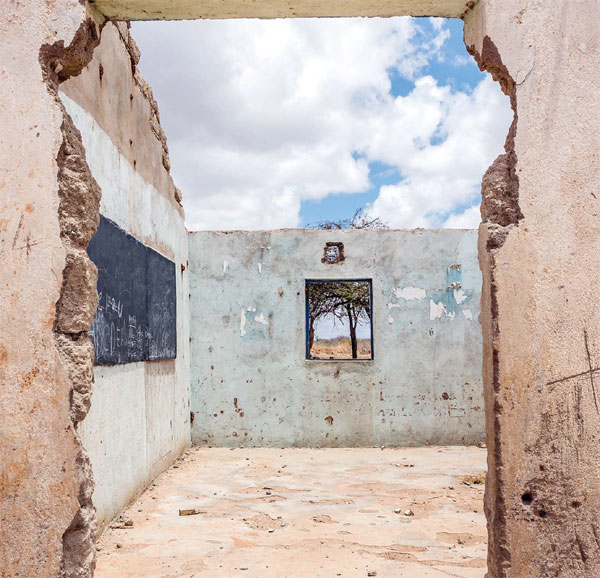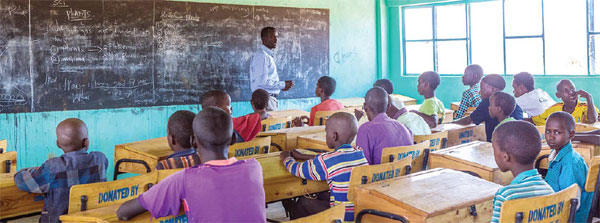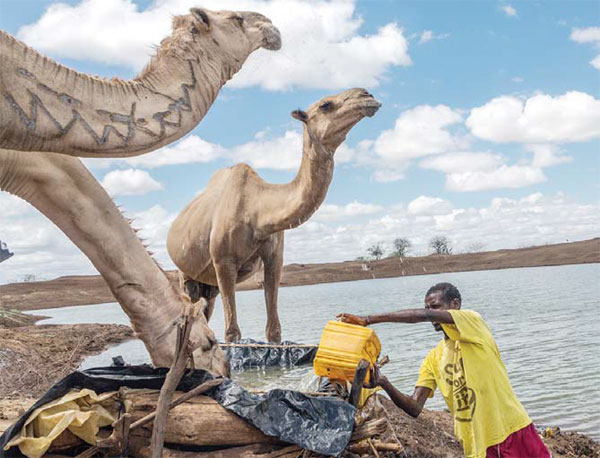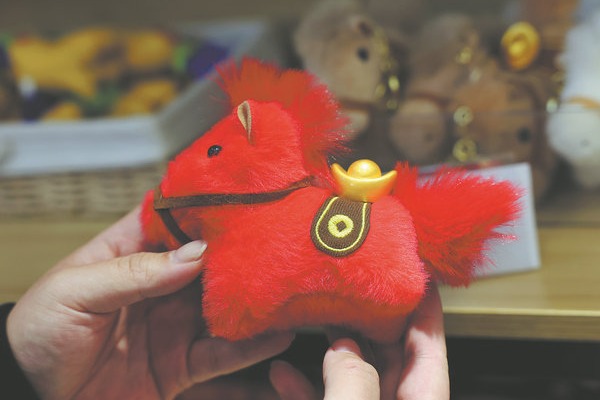Road to land that time forgot

Chinese firm's help in converting unpaved highway in northern Kenya into a modern road brings change to isolated zone
Parts of northern Kenya on the way to the Ethiopian border have been so isolated that when people who live there set out for Nairobi, they say they are "going to Kenya".
"They see it as another country," says Gabriel Negatu, regional director of the Eastern Africa Resource Center of the African Development Bank.
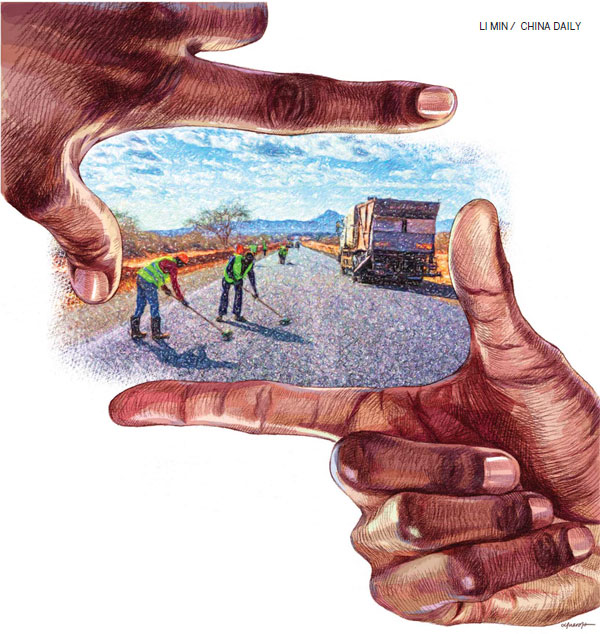
| Funanyata Primary School was damaged in a tribal conflict in 2013 in Moyale, northern Kenya. China Wuyi provided the local communities with two new classrooms nearby with chairs, tables and electricity. Photos by Xie Songxin / China Daily |
| Pupils at Funanyata Primary School in the classroom built by China Wuyi. |
| A Gabra tribe herdsman feeds his camels with water from a pool built by China Wuyi in northern Kenya. The Chinese firm is one of the contractors building the A2 highway. |
The only way in and out of this harsh, arid land is the A2 highway, which links Kenya and Ethiopia, a road that the BBC gave the sobriquet "the road of terror and death" because of banditry and unrest that plagued its northern extension.
After many decades of unfulfilled promises regarding the road and its security, stretching back to colonial times, the last unpaved portion of the A2 in Kenya is on the cusp of being completed.
In July, China Wuyi Co, one of the companies building the road, will complete the last portion assigned to it of the 130-kilometer stretch from Turbi to Moyale at the Ethiopian border. The company is an overseas arm of Fujian Construction Engineering Group and one of the largest Chinese construction companies in Kenya.
The last section of road is budgeted at 12.06 billion Kenyan shillings ($119 million), officials say. A Turkish company has also been working on the road. A final completion date has not yet been set.
Reconstruction of the entire 505 km of the road from Isiolo county in central Kenya to Marsabit and on to Moyale was expected to amount to over $500 million and has been funded by the African Development Bank, the Kenyan government and the European Union, according to an allAfrica.com report.
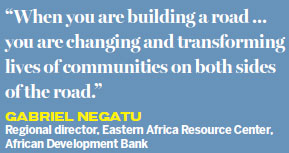
By 2012, the portion of the A2 heading north from Nairobi, the capital, had already seen a major improvement with construction of the 50-km Thika Superhighway by three Chinese companies, China Wuyi, Sinohydro Corp and Sinopec Shengli Oilfield. The $360 million project was funded by AfDB, the Kenyan government, and the Export-Import Bank of China.
But when the northern project started in 2013, it still took two to three days to go from Moyale on the Ethiopian border to Nairobi, which is about 780 kilometers away. Now, the travel time has been reduced to 10 to 12 hours.
During a recent visit to northern Kenya, several groups of bicyclists, in groups of two or three, were seen riding on newly built sections of the highway, and locals could be seen waving their hands at passers-by asking for a lift.
Armed police set up barricades and patrols passed by - reminders of potential danger and the road's dubious history.
Some sections are still unfinished, and in these areas motorists must drive on the original unpaved road. You have to reduce your speed, and if you're behind other vehicles, you'll be enveloped in a cloud of ochre dust.
It's far more dangerous in such areas, where the short but thick bush has always offered armed robbers a good place to hide, and the vehicles' slow speeds make the pickings easier.
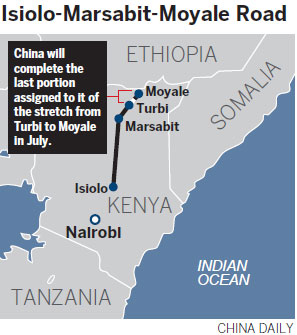
As "missing links" of the road on both the Kenyan and Ethiopian sides are finished and security improves, however, it is projected that average incomes of the households along it will increase by 30 percent by 2020.
Regional trade also is expected to benefit. Trade between Kenya and Ethiopia is forecast to rise from $62 million in 2009 to $200 million in 2017.
The road is an important part of the Cairo-Cape Town Trans-African Highway, linking the northern and southern ends of Africa.
It connects the second most-populous African nation, Ethiopia, with some 90 million people, and Egypt, third largest at 88.5 million, with the industrial powerhouse of South Africa, the fifth largest. Add in such countries as Tanzania at No 6 and Kenya at No 7 and you have a market of more than 350 million.
Trade within the Common Market for Eastern and Southern Africa, meanwhile, is expected to blossom. From 2009 to 2017, COMESA trade with Ethiopia is expected to increase from $522 million to at least $900 million, while the bloc's trade with Kenya should go from $1.67 billion to $2.1 billion.
"The road definitely contributes to this achievement," says Negatu of the Eastern Africa Resource Center.
The road also should be especially helpful for Ethiopia and Kenya, among the first recipients of industrial capacity transferred from China.
"We will do whatever is necessary to encourage more Chinese industrial companies to relocate to Africa and to the East Africa region, and facilitate infrastructure with policy and regulations so they can come and manufacture and sell in the region and globally," Negatu says.
An African Development Bank document outlining the effects of the road projects in Ethiopia and Kenya notes: "Hawassa and Ageremariam (in Ethiopia) are major coffee-producing areas, while the rest of the region is a key livestock-keeping zone and has potential for tourism. Northern Kenya has also been a major oil exploration zone."
The rebuilt road will better connect landlocked Ethiopia to the Kenyan port of Mombasa on the Indian Ocean, facilitating commerce.
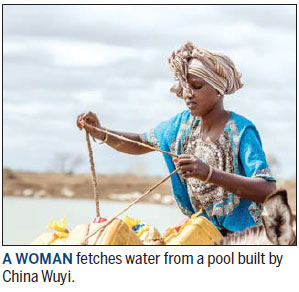
"When you are building a road, you are not just building a link from point A to point B, you are changing and transforming lives of communities on both sides of the road," Negatu says.
Tathai Hassin Koroto, assistant chief of a village in the Borana tribal community, who also runs a shop, has seen the benefits of the road. Instead of having to make a three-day trip to purchase commodities, he can go and come back twice in one day.
Shops that used to languish have been rejuvenated and new shops have been set up, Koroto says. Residents also gained access to the Internet after Wuyi came in to build the road.
Near Manyattas, where traditional temporary dwellings are constructed with tree branches and soil by herders, new and more solid cottages have arisen. This suggests that some people have settled down instead of following their herds to the most favorable water and pasture like before, residents say.
China Wuyi has built seven wells and 15 pools along the section of the road it is constructing. The company shares the water with local communities for domestic and livestock use, and will transfer all of them to the communities after they complete the road, says Chen Fuqiang, deputy general manager of the company. He says local people have been trained in the operation and maintenance of the facilities.
This has made a huge difference to 14-year-old goatherd Bonaya Wako, who used to have to herd his 300 goats for kilometers on foot, sometimes through dust kicked up from the dry, red land, to find water.
As a result of Wuyi's wells, "the water is just here near my home", says the boy, from the Borana community in Kenya's northern Marsabit county.
That's not a small thing here, where annual rainfall amounts in some areas barely reach 200 millimeters. Most of the 290,000 people in Marsabit are keepers of livestock.
"After communicating with the local community, we decided to build pools to conserve water in the rainy season," Chen says. In Marsabit, the rainiest part of the year, such as it is, is April.
After the idea turned out to be successful, the company expanded the pools, and they now have a total capacity of 358,000 cubic meters, serving about 10,000 people and 500,000 livestock, the company said.

The company also sent its water tanker trucks to local communities at least 200 times during dry seasons. "Even in the extremely dry time, we also do what we can to meet people's need for water," Chen says. He adds that he thinks better access to water and markets will allow for a great increase in livestock.
Such actions are crucial in an area where a feeling of "unfairness" and "being neglected" is a primary cause of conflicts, according to Richard Kiprono, assistant commissioner of Sololo sub-county.
Kiprono says previously there were armed robberies at least once or twice a month along the road in his sub-county.
Since Wuyi arrived to prepare for construction in 2012, the company has experienced five armed robberies, despite having hired about 50 armed police officers and 75 Kenya Police Reserve members.
There also is a risk of conflicts between tribal communities in the area, Kiprono says.
In a conflict between Borana and Gabra tribal communities in 2013 in Moyale, over 20 people were killed and more than 15 others injured in one day, and thousands of people were displaced, according to media reports. The fighting is believed to have arisen from political issues.
Funanyata Primary School was burned down during the fighting, depriving almost 200 students of schooling.
There also have been smaller conflicts over limited water resources as well, Kiprono says. But the wells and pools built by Wuyi have almost halted conflicts over water along the road, he says.
After the school burned, Wuyi built two classrooms and also donated 70 pairs of tables and desks.
"After people came back, Wuyi began to build the classrooms," says Kala Bante, former chief of Funanyata village.
Chen says the company is going to build another school in Bori village before they complete the project.
"The road assists greatly in improving security," Kiprono says, in part because it gives people "more access to security agents".
It also makes access to social services possible, which strengthens tribal communities' sense of belonging to the country, he adds.
Chen says skills introduced during the road project, such as training for local machine operators, will aid the area's development. The road also is likely to bring more tourists to the pristine game reserve inside Marsabit forest, home to elephants, buffaloes, zebras and other animals.
The road also will facilitate the work of NGOs in improving people's living and health conditions.
Along those lines, Wuyi has trained 900 local people in AIDS prevention. The company has even considered that the road will introduce an unaccustomed new hazard for local people - high-speed traffic - and has organized traffic safety lectures, training 500, many of whom are primary schools students.
Negatu says Kenya, for many local residents, has been perceived as "another country". He said that today, they are beginning to feel more like a part of Kenya. "This is a very important psychological impact."
(China Daily Africa Weekly 03/18/2016 page1)
Today's Top News
- Xi's article on boosting China's financial strength to be published
- Xi calls for breakthroughs in developing industries of the future
- Xi, Tebboune exchange congratulations over successful launch of Algerian satellite
- New chapter for Sino-UK trade ties
- Cross-border funds pilot to expand
- Coast Guard curbs foreign infringements
















